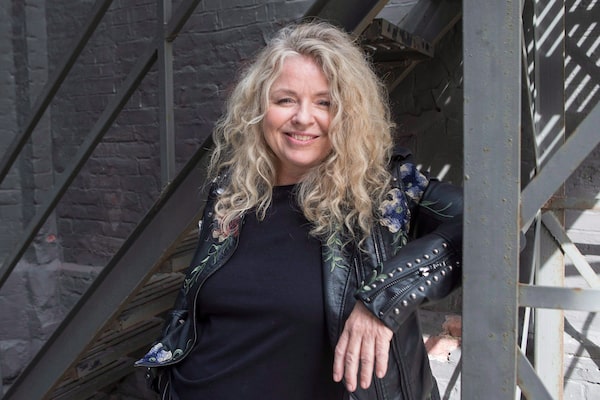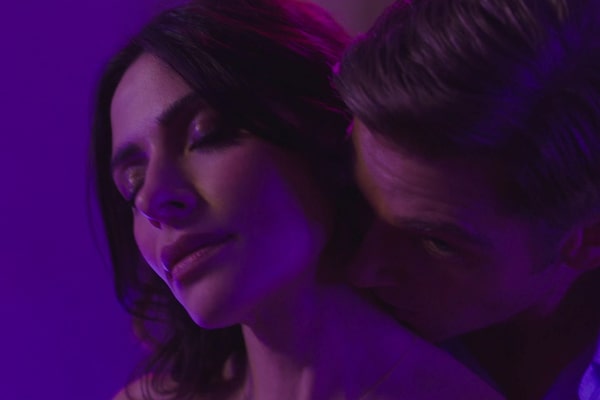
Director Patricia Rozema in 2018. 'I was attracted by being a pilot director – which at Netflix are called prototype directors – on a female-led project with a female lead, for one of the most powerful companies in the world,' Rozema said about working on Sex/Life.Chris Young/The Canadian Press
When Patricia Rozema heard that she’d be working with an intimacy co-ordinator on the Netflix series Sex/Life – she directed its first two episodes – she initially resisted the idea. Rozema has a history of filming sex with sensitivity, everything from married couples in the HBO series Tell Me You Love Me to violent assault in the film Into the Forest. (For the latter, she set the camera on the ground and showed only the actress’s face.)
“I thought, ‘I’m the intimacy co-ordinator!’” Rozema said last week, over a cup of tea in Toronto.
A recent addition to a film crew, an intimacy co-ordinator ensures safety in all aspects of sex and nudity.
“Ask anybody who’s worked with me – I would never dream of doing anything they didn’t want to do. The minute I called cut, I’d be the one to run in with the robe.”
Quickly, however, she saw the benefit of having a liaison. Many actors have a need to please, so if a director – who can affect their careers – asks for something, they might self-exploit. They can be more honest with an intimacy co-ordinator.
“I realized I’m still the person in power,” Rozema says.
Her embrace of an intimacy co-ordinator is just one example of how filmmaking – and Rozema’s power within it – are evolving in the #TimesUp era. In years past, she would walk into a meeting with film executives in Los Angeles or Toronto, “and either literally or psychologically, their arms would be crossed against me, with my woman-y thoughts and lesbian-y inclinations,” she says. “In both male and female executives, there was a general feeling of, ‘The guys won’t respect me if I choose her.’” After four decades in the business, Rozema finally has the pleasant if unfamiliar sensation that everyone in the room is rooting for her.
Sure, some of those meetings occur because a studio has a diversity box to tick. Sometimes she has to stand up to condescension, that maddening, “Oh, I’m all for the women getting a chance, but if we give them too much responsibility and they fall on their face, it’s not fair to them.” (Which never seems to be a worry with male directors.) She sometimes thinks, “Where was all this enthusiasm when I was 25?” But if it’s her turn now, she’s taking it.
Raised in Sarnia, Ont., Rozema credits her Dutch Calvinist parents for teaching her that hard work was more satisfying than praise. She never had a grand plan for her career – what guided her was an idea about what a rich creative life would feel like.
“Since my teens, I had a vision of me sitting in a rocking chair, with a row of film cans beside me,” she says. “Each can represents a person, an idea, a joke, a political statement. Together, they add up to my world view. I can barely look at my own work, but I wanted that, and I wanted to show it to the other old ladies in the nursing home.”
When her first feature, I’ve Heard the Mermaids Singing (1987), made Rozema a star in the independent film world, she did not succumb to the siren call of Hollywood.
“I remember thinking, ‘Find the right people in the U.S. to work with, but stay here,’” she says. “The Canadian film industry was just forming. I could make the work I wanted to make. I knew if I stuck it out, eventually everyone would discover that gays are people, too, and that it doesn’t take a penis to tell a good story.”
She didn’t fret about the scale of a project, or whether she was working with a studio, an independent producer or a streamer. “I make the present,” she says. “I don’t care what packaging you put on it.” She wasn’t swayed by money, either: “I turned down so many big opportunities it would make your hair curl. That sounds arrogant to say, but it isn’t.”
She’s currently as busy as she wants to be, as a director-for-hire on series, which have included Mozart in the Jungle and Anne with an E, as well as developing projects, including a film about Sylvia Beach, the owner of the legendary Paris bookstore Shakespeare and Company.
There were disappointments, of course – years without work, beloved projects that never came together, including an adaptation of The Stone Diaries and a spoof of Nancy Drew. But Rozema was always making something, even if it was tiny shorts on her phone, set to a piece of music. Her first short, which she made before Mermaids but has never talked about before, featured wooden art puppets covered in clay. As they danced to Schubert’s Death and the Maiden, their genders transformed, merged, changed again. She can’t remember what she called it, but it was some combination of testosterone and estrogen – Testrogen? It sounds relevant enough to the current moment that she should dig it up.
Rozema also makes watercolours, mostly elongated, Giacometti-like figures on a white background. She started doing those while living in New York’s Tribeca, shooting a film she declines to name, where the producers were a bit too controlling.
“I kept having this image,” she says, “I’m trying to paint and someone is holding the back of the brush. I realized it’s important for me to have artistic expression that doesn’t cost money or require other people.”

Sarah Shahi and Mike Vogel in Sex/Life.Courtesy of Netflix
Signing on to Sex/Life was a creative move for Rozema. “I like doing intimate scenes,” she says. “They’re so dangerous and vulnerable and hard to do in a realistic way.”
But it was also an exercise in what she calls “ego management” – on any series, the showrunner/writer is the auteur.
“I was attracted by being a pilot director – which at Netflix are called prototype directors – on a female-led project with a female lead, for one of the most powerful companies in the world,” she admits. “But no director would expect to have the freedom of a truly personal work in that context.”
This is a moment for reassessments and reckonings, so Rozema is asking herself some hard questions, too: When she was one of the few women in the Canadian indie-film pantheon, surrounded by white dudes at every film festival, why didn’t she call that out more? As a privileged white person, should she now step aside and make room for other voices? She’d happily use her power to co-produce the work of underrepresented filmmakers – but do those filmmakers want someone like her swooping in?
She’s worried that streaming may sweep away not only indies, which have always been fragile, but also one of her favourite components of film: the perfect ending. “Series are designed to keep going,” Rozema says. “Even limited series, if they’re successful. But the ending – that inevitable, surprising, cathartic thing – is how I decide what stays in a film. The ending is where the moral weight is revealed.”
Still, she’s as excited now by the possibilities of filmmaking as she was when she began. “With technology, with AI, with VR,” she rhymes off. “Will I write a show and download it directly into your brain? I would cryogenically freeze myself if I could. I always want to see what happens next.”
Sign up for The Globe’s arts and lifestyle newsletters for more news, columns and advice in your inbox.
 Johanna Schneller
Johanna Schneller